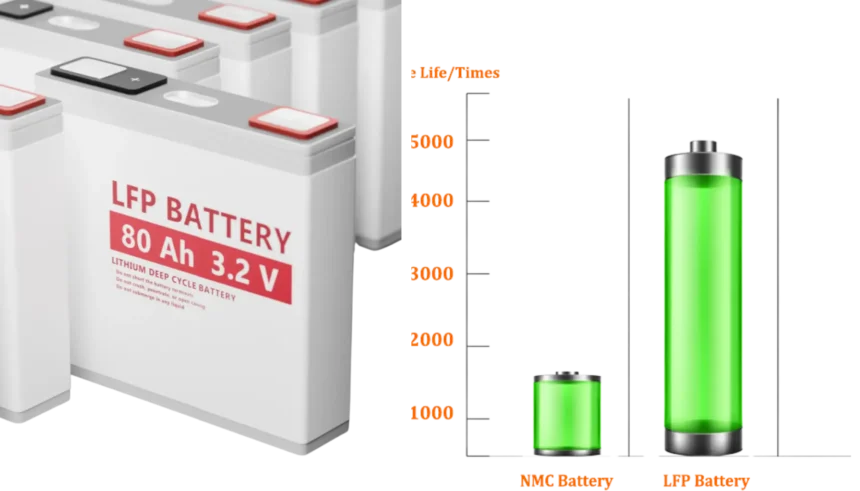Lithium iron phosphate (LFP) batteries have become a game-changer in the realm of energy storage. These batteries, known for their safety, longevity, and efficiency, are paving the way for a future where renewable energy is more viable and accessible. As we delve deeper into the world of LFP batteries, it becomes clear why they are considered the future of energy storage.
“The future of energy storage lies in innovative solutions that ensure sustainability and efficiency.” — Elon Musk
Elon Musk’s insight reflects the essential role that advanced technologies like LFP batteries play in transforming our energy landscape towards sustainability and efficiency.

Understanding LFP Batteries
LFP batteries, or lithium iron phosphate batteries, are a type of rechargeable battery with a lithium-ion chemistry. They are distinguished by their use of iron phosphate as a cathode material, offering several advantages over traditional lithium-ion batteries.
Key Characteristics of LFP Batteries
- Safety: Lower risk of overheating and thermal runaway.
- Longevity: Longer lifespan compared to other lithium-ion batteries.
- Stability: High chemical and thermal stability.
“Safety and efficiency are the pillars of modern energy solutions.” — Bill Gates
Bill Gates emphasizes the critical importance of safety and efficiency in developing energy technologies, which LFP batteries exemplify.

Advantages of LFP Batteries
LFP batteries offer numerous benefits that make them ideal for various applications, from electric vehicles to renewable energy storage.
Enhanced Safety Features
- Stable Chemistry: Reduced risk of fire and explosion.
- Temperature Tolerance: Performs well under high temperatures.
Longer Lifespan
- Cycle Life: Capable of thousands of charge and discharge cycles.
- Durability: Less degradation over time compared to other batteries.
“Longevity and reliability are key in the advancement of battery technology.” — Dr. John Goodenough
Dr. John Goodenough’s quote highlights the significance of durability in battery technology, a feature prominently offered by LFP batteries.

Applications of LFP Batteries
LFP batteries are versatile and used in a variety of fields, each benefiting from their unique properties.
Electric Vehicles
- Range and Efficiency: Provides stable power output over longer periods.
- Safety: Reduces risks associated with battery overheating.
Renewable Energy Storage
- Grid Stability: Supports the integration of renewable energy into the grid.
- Energy Independence: Enables effective storage for solar and wind energy.
“Energy storage is a crucial component in the transition to renewable energy.” — Ban Ki-moon
Ban Ki-moon’s perspective underscores the vital role energy storage plays in achieving a sustainable energy future.
Comparing LFP Batteries with Other Technologies
LFP batteries are often compared with other battery technologies to highlight their unique benefits and limitations.
Versus Lithium-Ion Batteries
- Safety: LFP batteries are safer with lower risk of thermal runaway.
- Lifespan: Longer cycle life compared to traditional lithium-ion batteries.
Versus Lead-Acid Batteries
- Energy Density: Higher energy density provides more power in a smaller package.
- Maintenance: LFP batteries require less maintenance and are more environmentally friendly.
“Innovation distinguishes between a leader and a follower.” — Steve Jobs
Steve Jobs’ quote emphasizes the innovative edge of LFP batteries, setting them apart from traditional energy storage solutions.

Future Trends in LFP Battery Technology
Its future looks promising with ongoing research and development aimed at enhancing their performance and application scope.
Research and Development
- Materials Science: Advancements in materials to improve battery efficiency and safety.
- Manufacturing Techniques: Innovations to reduce costs and increase production efficiency.
Market Growth
- Adoption in EVs: Increasing use in electric vehicles due to their safety and longevity.
- Energy Storage Systems: Growing implementation in large-scale energy storage projects.
“The real voyage of discovery consists not in seeking new landscapes, but in having new eyes.” — Marcel Proust
Marcel Proust’s words reflect the innovative mindset driving the evolution of LFP battery technology.
Environmental Impact of LFP Batteries
One of the significant advantages of these batteries is their relatively lower environmental impact.
Sustainability
- Non-Toxic Materials: Use of iron phosphate reduces environmental harm.
- Recyclability: Easier to recycle compared to other battery chemistries.
Reduced Carbon Footprint
- Efficiency: Higher efficiency leads to lower overall energy consumption.
- Longevity: Longer lifespan means fewer batteries need to be produced and disposed of.
“We do not inherit the earth from our ancestors; we borrow it from our children.” — Native American Proverb
This proverb underscores the importance of sustainable practices in technology development, a principle embodied by these batteries.
Challenges and Solutions
While LFP batteries offer numerous benefits, there are also challenges to their widespread adoption.
Cost Considerations
- Initial Investment: Higher upfront costs compared to some other battery types.
- Economies of Scale: Solutions lie in increasing production to reduce costs.
Performance Enhancements
- Energy Density: Ongoing research to improve energy density for better performance.
- Charging Speed: Innovations to enhance charging speeds without compromising safety.
“Challenges are what make life interesting; overcoming them is what makes life meaningful.” — Joshua J. Marine
Joshua J. Marine’s quote inspires the drive to overcome challenges in advancing LFP battery technology.
Integration of LFP batteries with Renewable Energy
They are crucial in integrating renewable energy sources into the grid, enhancing stability and reliability.
Solar and Wind Power
- Storage Solutions: Effective storage for intermittent renewable energy.
- Grid Management: Helps in balancing supply and demand.
Off-Grid Applications
- Rural Electrification: Provides power solutions in remote areas.
- Disaster Recovery: Essential in emergency power supply during natural disasters.
“The future is green energy, sustainability, renewable energy.” — Arnold Schwarzenegger
Arnold Schwarzenegger’s quote reflects the pivotal role of renewable energy and the technologies, like LFP batteries, that support it.
Practical Implementation of LFP Batteries
Implementing LFP batteries in various sectors requires a strategic approach to maximize their benefits.
Residential Use
- Home Energy Storage: Store energy from solar panels for use during peak hours.
- Smart Homes: Integrate with smart home systems for efficient energy use.
Industrial Applications
- Backup Power: Reliable backup power for critical industrial operations.
- Energy Management: Optimizes energy usage and reduces costs.
“Sustainability is not a goal to be reached but a way of thinking, a way of being, a principle we must embrace.” — François Hollande
François Hollande’s quote encapsulates the mindset necessary for adopting sustainable technologies like LFP batteries.
For more detailed information, visit Battery University and CleanTechnica.














